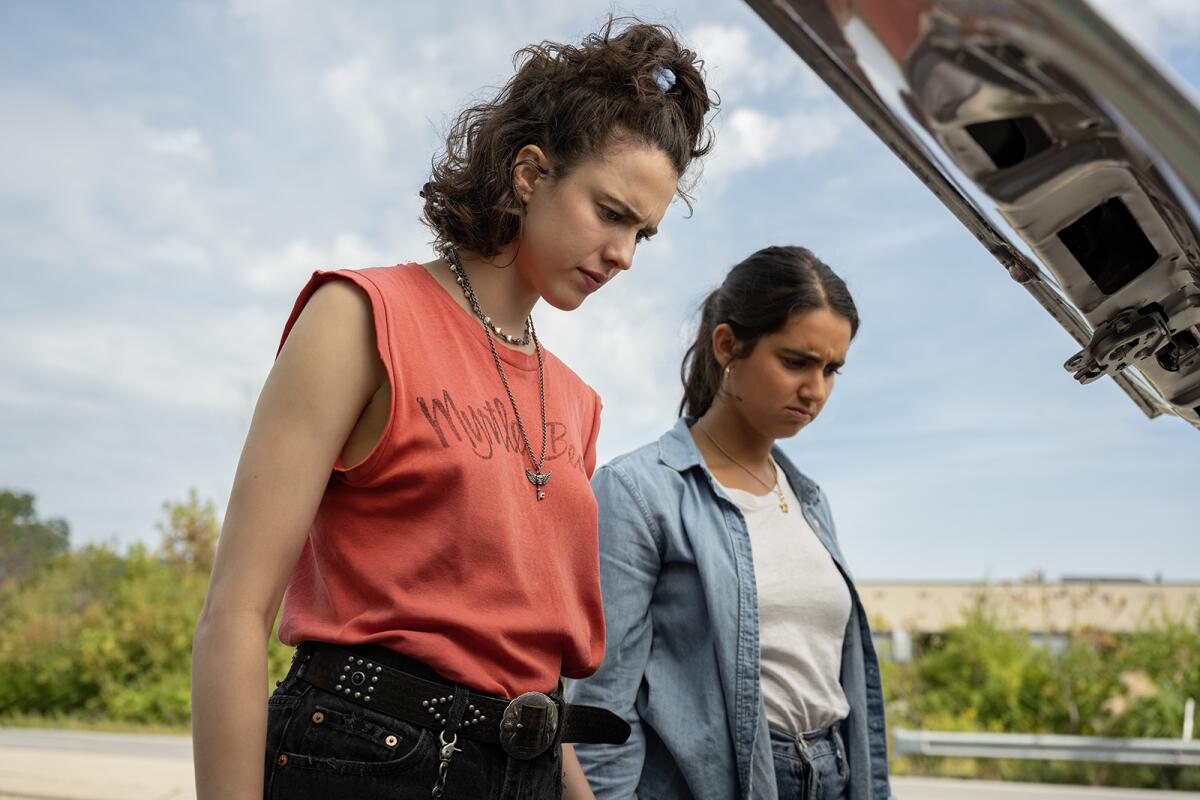Set in Philadelphia in 1999, Drive-Away Dolls, co-directed by Ethan Coen and Tricia Cooke, centers around the flagrantly uninhibited Texan Jamie (Margaret Qualley) and her uptight best friend, Marian (Geraldine Viswanathan). Jamie cheats on her girlfriend Sukie (Beanie Feldstein), a cop with anger issues, and is promptly kicked out of her apartment. Upon learning that Marian is traveling to Tallahassee to spend time with her grandmother, Jamie seizes the chance to accompany her to quell her heartbreak. She hopes to finally break Marian out of her shell and get her laid by at least one fellow lesbian for good measure.
Jamie and Marian sign on to transport a “drive-away” car to Tallahassee from a business run by a hilariously droll gentleman named Curlie (Bill Camp). Jamie spray paints “Love is a sleigh ride to Hell” on the trunk and makes it her mission to visit as many lesbian bars as possible en-route. If they manage to find a girls sports team at a local diner, all the better.
Turns out, however, that the two pals weren’t meant to drive this car in the first place. There’s a suitcase and hatbox in the trunk they are absolutely not supposed to find. Bumbling goons Arliss (Joey Slotnick) and Flint (C.J. Wilson), led by the menacing Chief (Colman Domingo), are out to find Jamie and Marian and retrieve the mysterious goods by any means necessary — one of which contains a souvenir of an ultraviolent clash shown in the film’s opening moments. Once Jamie and Marian find out what they’re carrying, things spiral wildly out of control.
Operating at a fast clip that leaves little room for reflection, and packed with sex and violence, Drive-Away Dolls doesn’t aim for profundity or reach the heights of Coen’s best work. There’s ample enjoyment to be found here, though. The film’s sheer gusto and likable performances overcome a script that’s only sporadically effective in its gross-out provocations.
Indeed, a sense of free-spiritedness flows throughout Drive-Away Dolls, from its frank, unabashedly queer focus, to its unhinged plot twists, to its in-your-face-jarring scene transitions, and garish, psychedelic interludes featuring Miley Cyrus in full hippy-mode. The film’s B-movie aspirations are apparent from the get-go, adopting a freeform, fast-paced vigor. Coen and Cooke’s “balls-to-the-wall” philosophy is admirable in its confidence, supported by an ensemble fully on the film’s bawdy wavelength. This propulsive approach compensates for the plot’s simplicity and preference for crass shocks with low-hanging targets.
Qualley and Viswanathan have great chemistry, revealing some poignant (but never dwelled upon) emotional layers in between their dry, often vulgar zingers that transcend archetypes. Qualley is particularly effective conveying Jamie’s attention-seeking urges, with a cartoonish accent to boot, while Viswanathan nails Marian’s deadpan angst and longing for more in life. Both characters are searching for purpose and direction, perhaps with each other — which their adventure edges them towards. Drive-Away Dolls never slows down enough to let us sit with Jamie and Marian in their feelings, but Qualley and Viswanathan are keenly dialed-in to the film’s zany rhythms. The otherwise uneven material is all the better for it.
The rest of the cast is similarly committed, albeit not given enough time to fully inhabit their characters during the 84-minute runtime. Feldstein lends volatility to Sukie — who, in spite of her resentment towards Jamie, goes out of her way to help her, getting to live out her policewoman fantasies (with a chihuahua in tow). Camp steals scenes as the bluntly funny Curlie, a character that’s so stuck in routines and “convention” that Coen and Cooke toss him aside like some twisted joke. Domingo is commanding yet underused, and Slotnick and Wilson make a great pairing, too; their antagonistic characters are a hair’s breadth from tearing out each other’s throats. Pedro Pascal amusingly leans into goofiness, and Matt Damon practically walks away with the whole film in his brief appearance as a crooked politician.
These performances, combined with the directors’ stylistic panache, render Drive-Away Dolls consistently watchable. If nothing else, it’s worth appreciating the production’s commitment to the bit. This makes up for the fact that Coen and Cooke’s “out-there” reveals are too blunt and forced to leave much of an impact, either comically or dramatically.
Still, notwithstanding its crude nature, Drive-Away Dolls is charming in its rambunctious energy, its assertion of the liberating power of sex, and how embracing one’s true self, regardless of insecurities and antiquated societal norms, is essential for living meaningfully. There’s something strangely heart-warming in that takeaway; Coen and Cooke’s erratic approach yields a pure, joyous sense of life that’s difficult to resist.
READ NEXT: Make the Case: 7 Best David Warner Movies
Some of the coverage you find on Cultured Vultures contains affiliate links, which provide us with small commissions based on purchases made from visiting our site.


